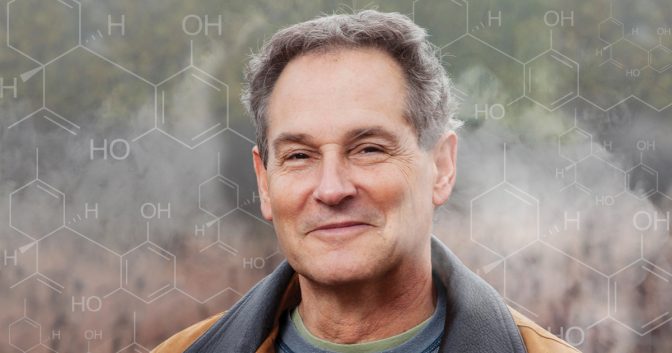10 Questions with Project CBD’s Martin A. Lee

Cofounder and director of Project CBD, an educational nonprofit that reports on cannabis science and therapeutics, Martin A. Lee is also the author of Smoke Signals: A Social History of Marijuana—Medical, Recreational and Scientific (2012) and Acid Dreams: A Social History of LSD—the CIA, the Sixties and Beyond (1985).
How did you get interested in CBD?
I heard about it as a journalist attending and covering science conferences. I started writing about cannabis—the medical marijuana phenomenon—when I moved to California. I was drawn into it mainly from a civil rights/social justice perspective. Why are people still being busted if this is legal and for medical use?
It was a whole universe that opened up, which I had no idea about at all. So I started to focus on cannabis science and therapeutics, rather than just the raids by the police and that kind of thing, which was what initially drew me into writing about cannabis. It kind of changed course.
But what specifically sparked your interest in cannabidiol?
I would hear about CBD from scientists at these conferences. Steep Hill, the first lab that emerged to service the medical marijuana community, was able to identify both THC and CBD levels in the various cultivars. When these different CBD-rich strains popped up, that was it! What will this do? How will this affect people? Fred Gardner and I knew this was going to have a potentially major impact for not just patients, but for the whole medical marijuana phenomenon. Right away, we thought this could be a tremendous challenge to prohibition and the drug war, and that it would be very difficult for the DEA to respond to CBD and explain why it should be kept illegal.
What’s amazing is now you can get CBD in gas stations across America. It’s strictly illegal and it’s everywhere. It’s like the plant outfoxed the drug warriors.
It really was not anticipated that CBD would charge ahead of THC.
For people who are outside the cannabis sphere, the idea that it can have health benefits and not get you high is very irresistible. That’s really compelling to a lot of people. And that’s OK with me. With any luck, they’ll learn that they like getting high. If CBD can be the gateway to THC, I think that’s great. It’s a powerful thing. Our hunches about it were correct. It’s a way of driving legalization to the next step. Legalizing industrial hemp, that’s huge, and legal CBD is in pretty much every state now. It’s basically de facto legal.
THC is getting a negative connotation these days in some cannabis circles. Why is that?
Some people can tolerate CBD much easier than they can tolerate THC, which means it’s going to have a wider potential group of users. CBD’s psychoactivity is easier to manage than THC’s, although THC is important medicinally. There are good reasons why there’s such a CBD craze now, but it’s not the only game in town. That’s the important thing.
For children with terrible seizure disorders, a CBD-rich oil can result in remarkable changes. It’s really almost miraculous what it does. But for some children with epilepsy, it doesn’t work at all and it can make it worse; they need something with more THC in it to help them.
“It will be really impossible to practically implement legalizing just one component of the plant. It’s impossible to enforce that.”
The problem is everyone’s smitten with the idea about CBD as the medicinal muscle of the plant. It’s one of many compounds in the plant; it partners with THC as a power couple. But it’s a couple, not as an isolate, and it’s important that people remember that. Policy skews in a direction that privileges CBD over the rest of the plant. In one way, it’s a step forward. In another way, it’s a continuation of prohibition. It’s an ironic situation, but we should be very thankful that the gift of CBD is available to us.
CBD is a component of cannabis’ entourage effect, right?
Absolutely. There’s no question. We’ve seen this over and over. To me, it’s not a theory about synergy, or entourage, or the ensemble effect. The science is showing that this is real.
Do you expect CBD to be rescheduled or descheduled in the near future?
I don’t know what the DEA will ultimately do, but certainly there’s pressure to reassess how the plant is scheduled, or if it should be scheduled at all. The fact that CBD has been approved as a pharmaceutical, now at Schedule V, with Epidiolex, which is pure CBD, that would mean if the FDA does what it ordinarily does, it would not allow herbal versions of that on the marketplace. The whole FDA regulatory apparatus favors pharmaceuticals. It does not favor herbal medicines.
This is a major phenomenon. CBD has become the hot nutraceutical and there’s huge consumer demand. So, in a sense, CBD has really flummoxed them and is forcing them to consider shifting gears in some way to accommodate the therapeutic potential of CBD-rich cannabis, not just CBD.
“CBD is a very powerful molecule. It’s part of a plant that’s brimming with therapeutic attributes.”
But as long as the Controlled Substances Act (CSA) is on the books, we’ll always have problems. It will be impossible to practically implement legalizing just one component of the plant. It’s impossible to enforce that, to say this part is legal and that other parts are illegal.
The federal government has to give way on this, but I can easily see the DEA holding out, making it go to court and people fight this tooth and nail for the next couple of years until there’s clarity with this issue, because right now, where we seem to be heading is to legalizing industrial hemp for the growing of plants with biomass to extract CBD. That’s going to be legal nationally soon, when the Farm Bill passes at the end of the year.
How will this affect domestic hemp cultivation?
You’ll be allowed to grow hemp, but then afterwards, it’s not clear what happens. When you extract an oil and it goes over 0.3% THC because it becomes concentrated, then it’s illegal, so then you’d have to take THC out. The whole thing’s a mess because the CSA is still the law of the land, and as long as that’s the case, we’re going to be dealing with absurdity when it comes to drug policy.
CBD is being touted for hangovers to serious illnesses and everything in between. How widely applicable are CBD medicines?
They are widely applicable, but we shouldn’t romanticize them or make grandiose assumptions. CBD is a very powerful molecule. It’s part of a plant that’s brimming with therapeutic attributes. CBD is therapeutic because it mimics and augments endogenous compounds. These endogenous cannabinoids are part of the endocannabinoid system, which exists in every mammal and many other animals. All people have one. It’s very difficult to find a disease that doesn’t involve dysregulation of the endocannabinoid system in some way. If one can regulate the endocannabinoid system—improve it, tune it up, augment it when something goes wrong—that can be helpful for many different diseases.
«CBD is It’s strictly illegal and it’s everywhere.”
But the important thing to emphasize is that CBD is just one molecule in the plant, one compound, and it works best when it’s part of the whole plant matrix in combination with THC. There are some conditions where a THC-rich remedy will be better and more effective than a CBD-rich one.
What kind of impact do you think that the Epidiolex scheduling decision is going to have as far as other cannabis medicines?
It’s hard to say. Again, the DEA can stall, it can make excuses, it can say anything from the resin is illegal or that the United States always abides by its treaties—in this case, the UN’s Single Convention on Narcotic Drugs—so they can’t change it and it has to stay Schedule I. The contradiction is so glaring at this point.
Epidiolex is 99.5% CBD. It’s essentially just a CBD isolate. If anything, you could argue that it shouldn’t even be Schedule V. It just should be descheduled. But Schedule V’s a lower schedule. Epidiolex went through all these trials, it’s got to go somewhere on the schedule and so that’s where they put it.
We need to change the law, rather than make one part of the plant legal. I’m not sure strategically how much further that can go, the sort of single molecule strategy of legalizing just CBD. I think that it will reach its limit, with the Farm Bill, and then we’re going to be in a cul-de-sac, and we’ll have to confront the fact that you can’t interpret your way out of the CSA. You have to just change it or eliminate it.
Are you working on any other book projects?
Project CBD is the platform where my work is hosted on, and I think for the foreseeable future that’s where my focus will be, because there’s a lot to do there. The website is strategically positioned in this whole phenomenon and that’s not something I’m going to walk away from. It’s a good platform, a strong one, and if anything, I want to develop that and strengthen it and bring more people into it – use it to launch more, not just writing, but all kinds of activist projects.
Related Articles
Freedom Leaf Dives into the Hemp-CBD Market
Joy Beckerman: Hemp Industries Association Evangelist
U.S. Chemist Roger Adams Isolated CBD 75 Years Ago
This article appears in Issue 34. Subscribe to the magazine here.

